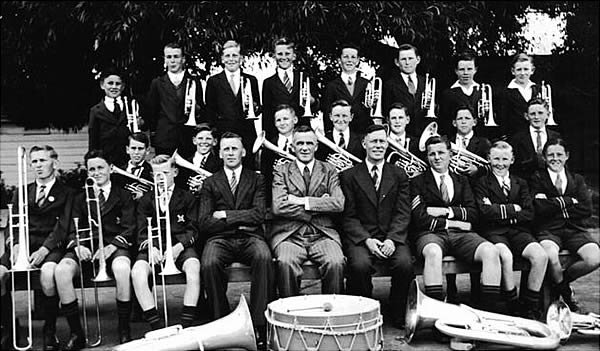[ Return ]
The history of the Motueka Municipal Band
Posted August 27th, 2012
By Coralie Smith.
Brian Hickmott has been a member of the Brass Band under its various names for 67 years, 25 of them as conductor. He joined while still at school during World War 2 when the band was under the auspices of the Motueka Borough Council. The band had gone into recess with many of the band members serving overseas. The instruments belonged to the council and were in storage.
Gerald Green asked if the school boys could use the instruments to form a Boys Band and this they did. They marched the pupils of the Motueka District High School from assembly into school every week.
Brian started playing on the cornet, moved to the trumpet but eventually ended up playing the euphonium. Many of the boys he started playing with remained with the band - Ross Mickell, Alan Drogemuller and Ron Drummond to name three.
The instruments were not in good shape and Mr Green would light his cigar, blow smoke down through the mouthpiece and wrap tape around the places where the smoke seeped out.
In 1948 it was decided that the boys were good enough to go to the National Brass Band competitions in Dunedin. What an adventure! They had hardly been to Nelson let alone Dunedin. A bus trip with Alf Smith to Blenheim, a rail trip to Christchurch and after a night there on the train again for Dunedin. Their uniforms were secondhand Air Force dyed black and the dye ran and showed on their white collars.
According to Mr Green they played "like little angels".
Fifty years later they went to Dunedin again with many of the same members.
Early newspaper reports tell of a brass band as early as 1880. This band made an intrepid journey over the hill to Takaka. They rode on horses on the old bridal track, stopping for a meal at Upper Takaka. The men carried their own instruments, which was a trial for the chap who played the big bass drum. His horse started every time the drum banged against a bush or tree.
So a brass band has been in Motueka for over 130 years and is attracting more young people now than ever before. It hasn't always been the case. Fundraising has always been part of the band's activities in order to buy uniforms, instruments and pay for travel to competitions.
In the 1930s the funds were so low and the numbers so few that it looked as if the band would disappear. An appeal to the Borough Council saw them take over the finances. There were conditions, however, and the band had to play at certain functions and perform publicly so many times per year in return for their money.
Although they still get a grant from the present Tasman District Council there are no obligations. Fundraising still goes on though, especially as an instrument that cost 2000 pounds in 1954 would now cost something in the region of $80,000. Fundraising over the years has included growing tobacco and potatoes, collecting cans and bottles, playing on the back of a truck around the streets of Motueka at Christmas time, and public donations.
In 1954 the Motueka Highland Pipe Band was formed and to launch their arrival a combined brass and pipes festival was held. This continued to be a regular event until recent years.
The brass band also managed to join the West Coast bands in annual competitions as well as go away to national competitions. A D Grade band they have had their winning moments as a band and as individuals. Some of the names remembered with pride are Chris Campbell and Vance Woolf, who went on to have successful careers in brass band music. Ernie Edwards is remembered for his work with the baton, now mounted and framed in pride of place at the band rooms in Old Wharf Road.
Two other stalwarts of the band gave been Tom Taylor and George Hope.
The band rooms are another testament to the volunteers' efforts. At one time they met in an old tobacco shed behind the council chambers in High Street next to the Methodist Church (now the Gothic Restaurant). They shared with the rifle club.
The rules and regulations for competition work have been changed and adapted to modern times as has the type of music played and the instruments allowed. There are a lot more percussion instruments used now.
A few notes from Brian on his beloved euphonium showed that blowing a brass instrument for 67 years must be good for your lungs.
When next you hear the sound of the brass band marching down High Street in the Santa Parade or at the A & P Show or the midwinter swim or at any of the many events they attend, think of the hours of practice they have put in to teach the next generation of players, the practice with their marching, and the fundraising hours and be thankful that we still have a band that stirs the blood - many small towns have seen theirs disappear.

Motueka District High School Band 1940
Back: Selwyn (Tama) Bailey, Nolan Ewers, David Driver, Alex Glover, Tiny Bob Thorp, Ron Drummond, Noel Dennett, Rollo Wilkinson.
Centre: Murray Thomas, Ken Congdon, Harold Ward, Bob Le Frantz, Eric Jackson, Reg Congdon, John Barr.
Front: Bertram York, Ian Delaney, Mac Brownlie, Bill Bryant, Alex Barr (headmaster), Gerald Green, Eymard(sic) Curtain, Rex Skilton, Buster James.
>> , possibly to be added to the page.
[ Return ]